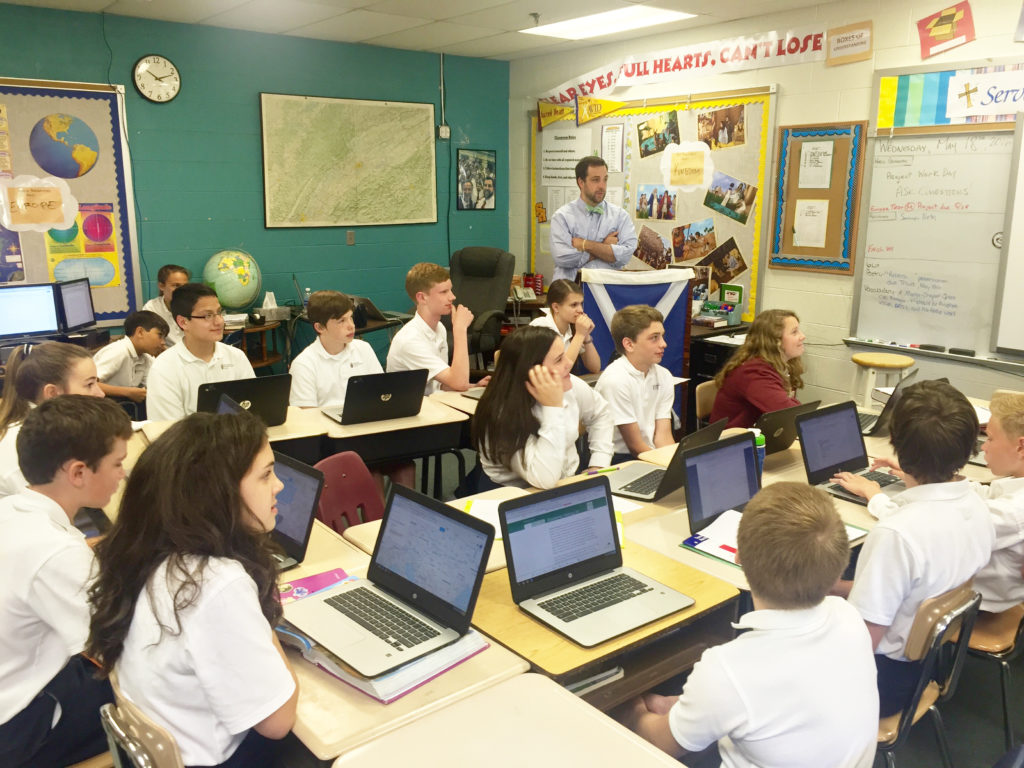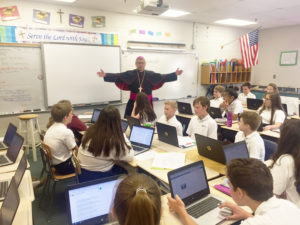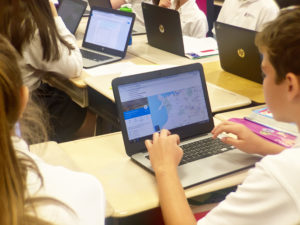
Sacred Heart School teacher Davis Bodie leads his class in a lesson that incorporates new Chromebooks the students will use regularly.
Teachers, students embrace educational technology programs being integrated into standard curricula
By Bill Brewer
Diocese of Knoxville schools are making major investments in technology with the adoption of one-PC-per-student programs that will level the playing field for computer access.
And upgrades in infrastructure are allowing teachers and students to tap into the information-rich Internet.
St. Mary School in Oak Ridge, St. John Neumann School in Farragut, and St. Joseph School, Knoxville Catholic High School, and Sacred Heart Cathedral School in Knoxville are among the schools rolling out new programs to merge academics and computer technology.
Sacred Heart has announced the launch of a 1:1 Google Chromebook program in its middle school as well as a greatly enhanced ratio for technology in all grades.
Sacred Heart is funding the initiative from an April fundraiser that raised $45,000 for educational technology and the purchase of Chromebooks.
The Chromebooks, which are cloud-based laptop computers that run the Google Chrome operating system and Google Apps for Education (GAFE), will be distributed to students for the 2016-17 school year.
Sacred Heart became an official GAFE school earlier this year as teachers learned to implement tools allowing students to communicate, collaborate and research using products such as Gmail, Google Drive, Docs, My Maps, Sheets and Google Classroom, a learning management system that allows for virtual teacher and student interaction.
“Sacred Heart has made remarkable progress in educational technology this year,” Principal Daniel Breen said. “We had over $2 million in renovations and improvements to the school last summer and that included a total rewiring of the school’s technology infrastructure. Because our Internet is now reliable and 15 times faster than it was last year, we have had teachers and students clamoring for more devices and more time with technology.”
The school partnered with Net3IT on technology infrastructure improvements, including an upgrade from one gigabyte to 10GB switches, installation of numerous wireless access points, and a redundant bandwidth system.
Mr. Breen added that teachers invested time during the 2015-16 school year learning about and getting comfortable with two Chromebook carts for student use that the school purchased. The school’s librarians are providing ongoing training sessions for teachers, three of whom have become Google-certified educators.
Sacred Heart librarian Rachel Best said she is eager to work with teachers “to expand on their knowledge of technology and information literacy.”
And middle-school teacher Shannon Briselden said her students are motivated by online math work as they “enjoy the competition, extra practice, and the challenge of this approach.”

Bishop Richard F. Stika visits with Sacred Heart School students who are beginning to use Chromebooks in their studies.
Schools across the country, from pre-K and kindergarten through college and post-graduate programs, are recognizing the benefits of educational technology, discovering that students are more engaged when they can collaborate easily with peers, when they can get immediate feedback on their work, and when their individual academic needs are better met.
Sacred Heart Google-certified teacher Nicole Erwin said when that happens, then it can be said that educators are getting the most out of the technology experience.
“Students are able to express their learning in new ways through educational technology,” Mrs. Erwin said.
The Sacred Heart technology team has been refining plans for the rollout of 1:1 this month. The plan includes a Chromebook for each middle school student and an improved ratio for fourth and fifth grades. To educate both students and parents on Chromebooks, Google tools, Internet safety and more, devices will not go home with middle schoolers in the first year.
“The school is committed to best practices in guarding student privacy and will help guide students to develop them to be great Catholic digital citizens. ‘Screen time’ will be carefully monitored, and the school will be sensitive to the needs of families without Internet access at home,” Mr. Breen said. “Sacred Heart’s growth in educational technology is a wonderful development directly connected to the professionalism and dedication of the school’s teachers and to the strong support of the Sacred Heart Cathedral School community. The launch of the 1:1 Google Chromebook program is an important step.”
St. Mary School in Oak Ridge held a celebration May 4 to recognize the St. Mary’s Legacy Foundation of East Tennessee for two grants totaling $40,965, which helped the school provide Google Chromebook computers.
The grant paid for Chromebooks for each third- through fifth-grader. With that investment, every student at the school now has a computer.
A grant of $29,200 helped support wireless infrastructure as well as provide the Chromebooks. A second grant of $11,765 was used for replacing an outdated public address system and safety upgrades.
Bishop Stika has said that the St. Mary’s Legacy Foundation grants are effective in supporting spiritual formation, charity, and education.
“This is an excellent example of just that,” Bishop Stika said. “Just visiting with the young men and women here in the school, the impact that these computers have on the students and on the faculty just enlarges the capacity of what they can do.”
Like at Sacred Heart, teachers at St. Mary are excited about the impact educational technology can have on students.
“We’ve had the opportunity to personalize or differentiate the education for the instruction of every student,” said St. Mary first-grade teacher Katie Schreiber. “There are a variety of programs in math, language arts, reading, phonics, and we’re able to assess where each student is and then the program is tailored to their needs, so we can challenge all students and provide everything from intervention to enrichment.
“The result of having the Chromebooks in the classrooms—our language-arts skills have increased, our math scores have increased dramatically, and we’ve seen a forward acceleration in all curriculums and a greater coverage of material this year. I actually finished my regular first-grade curriculum material early and have been able to challenge and go beyond first grade.”

Diocese of Knoxville schools are adding digital technology to their curricula to provide teachers and students with the latest education tools.
St. Mary principal Sister Marie Blanchette, OP, said last spring that the school is seeing the fruit of every student having a Chromebook.
“The students are very much more engaged in classes,” she said. “They’re able to work at their level. They can be challenged. There can be remediation. The students are really ramping up their editing skills and producing much better work, because the work is still fresh when they have a change to edit it—they’re not tired of the document.”
Sister Marie Blanchette praised the St. Mary’s Legacy Foundation for the grant money, noting that the school would have had to wait years, saving dollars and cents from box tops and Kroger Rewards to purchase the Chromebooks.
At St. John Neumann School, technology is now embedded in student learning through the use of cross-curricular instruction and regular technology classes in grades kindergarten through eighth.
The school also is incorporating Mimio interactive boards, Smartboards, personal computers, laptops, iPads, cell phones, and other tools to support the curriculum. And electronic versions of some student textbooks are available for students to use at home.
Students in fifth through eighth grades can bring e-readers or tablets to school to use for reading Accelerated Reader texts that they already have downloaded to their devices. All students are required to have parental consent to use the technology and must strictly adhere to school computer technology policies.
Like its peers within the diocese, St. Joseph School said it recognizes that its students are of the digital age and must have the skills to navigate it successfully.
St. Joseph students learn keyboarding and research skills using Internet sources in a state-of-the-art computer lab that opened in 2009. Classrooms now are equipped with up to eight computers and there is a 12-station writing lab and five-unit mobile laptop lab in the middle school.
The school also is incorporating interactive technologies such as SMART Boards in grades five through eight, Promethean Boards in grades three and four, and Turning Point and Active Expressions response systems for grades three through eight.
St. Joseph also is migrating digital media instruction into its educational technology curriculum, teaching photography and videography through elective classes. Through this program, St. Joseph has been effectively live streaming school events over the Internet.
And beginning with the 2016-17 school year, Knoxville Catholic High School is launching its own 1:1 educational technology curriculum through a Bring Your Own Device program, in which students will be required to bring their own computer device to classes.
“The BYOD Initiative is designed to enable students to broaden research capacity and increase learning modalities. The laptop is not the focus of the goal, but the tool that will connect instruction to technology,” according to a KCHS statement.
The devices must have screen sizes that are a minimum of 10 inches and minimum resolution of 1024 by 768. They must have a minimum of 2 GB of random-access memory (RAM) and minimum storage of 250 GB, with batteries that can hold a charge for a full school day.
The devices are required to have keyboards, not just touch pads, as well as built-in cameras and microphones, a processor that at minimum is an Intel i5 or equivalent, and must be compliant with wireless connectivity standards 802.11ac, 802.11n, 802.11g, or 802.11b.
KCHS said that since it is a Windows environment, the devices must use Microsoft Windows 7 or higher. MacBooks and Chromebooks will not be permitted. The school has purchased licensing for Microsoft Office Suite, which will be available to students free of charge.
Diocese of Knoxville schools Superintendent Sister Mary Marta Abbott, RSM, and diocesan schools Director of Curriculum and Instruction Sedonna Prater are applauding the schools’ investments in educational technology.
“It’s important because the students of this generation already are digital natives. This is the language they speak. Our schools need to be providing this innovation so they can meet the 21st-century expectations,” Mrs. Prater said.
She noted that high school graduates entering college are expected to be familiar with PC-based curriculum because more university courses require students to have computer devices.
Educational technology curriculum also stimulates teaching.
“Having access to that technology allows teachers to do innovative techniques in learning,” Mrs. Prater noted.
Sister Mary Marta credited St. Joseph School with being the first in the diocese to incorporate mobile devices in curriculum.
Other schools have quickly adapted.
“It’s been a progression of the technology. There is a movement to provide digital devices for all students in all of our schools,” Mrs. Prater said, adding that infrastructure boundaries have been the biggest barrier to adopting digital devices.
“The schools are investing in their infrastructure now, so we can continue moving to 1:1 programs,” Sister Mary Marta said. ■
